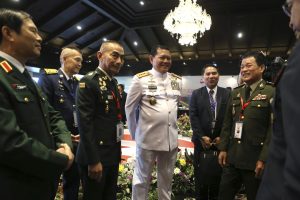Indonesia has announced that it will move an upcoming joint Southeast Asian military exercise out of disputed waters in the South China Sea, at a time of growing tension between China and several states in the region over maritime and territorial disputes.
According to Radio Free Asia, the Indonesian military announced on Tuesday a change of location for the Association of Southeast Asian Nations (ASEAN) exercise, which will take place on September 18-25. The announcement by Indonesia, this year’s chair of ASEAN, came after representatives from the 10 nations of the bloc held an initial planning conference for the joint exercises.
The drills were originally planned to take place in the North Natuna Sea within Indonesia’s exclusive economic zone (EEZ), part of which is bisected by China’s “nine-dash line” maritime claim. The ASEAN exercise will now take place in uncontested waters including around “Batam and the waters of South Natuna that are part of Indonesia’s archipelagic sea lane,” military spokesman Col. Suhendro Oktosatrio said.
The Southeast Asian drills, which are known officially as the ASEAN Solidity Exercise (ENatuna) or Asec01N, will reportedly involve all 10 ASEAN member states plus Timor-Leste, which has applied to join the Southeast Asian bloc. They will involve only non-combat drills, including joint maritime patrols, medical evacuations, and natural disaster relief operations. While ASEAN’s members have held naval drills with outside powers including the United States and China, they have never staged military exercises as a unit.
The ENatuna exercise was announced at a time when several Southeast Asian nations, particularly Vietnam and the Philippines, are responding more strongly to China’s assertiveness in the South China Sea. The waters around the Natuna Islands have been the subject of friction between Indonesia and China over the past decade. While Jakarta denies that it has a maritime and territorial dispute with China, the government has protested the frequent incursions of Chinese fishing boats and coast guard vessels into its EEZ. Indeed, the situation prompted Jakarta to rename the area the North Natuna Sea in 2017.
Indonesian military officials say that the reason for the shift has nothing to do with the maritime and territorial disputes. Rear Adm. Julius Widjojono, another Indonesian official, said that the new location near Batam island was chosen because it was suitable for the nature of the drills that will be conducted. “Priority is given to areas that are prone to disasters,” RFA reported him as saying.
However, the change of plan follows reports that Cambodia’s government has denied a joint ASEAN drill in the South China Sea. After Indonesia announced the exercises earlier this month following meetings of ASEAN defense officials in Bali, Cambodia denied that anything had been decided, issuing a statement that it had been asked to join a military drill and was establishing a working group to look into it. A report from the government mouthpiece Fresh News said that the initial announcement of the exercises “does not indicate ASEAN joint military drills in the South China Sea.”
It is unclear exactly what the Cambodian objection is, but it is conceivable that the country’s relationship with Beijing, which has become a strong backer of Prime Minister Hun Sen’s government, has made it leery about taking part in drills that could be seen as a direct challenge to China.
The Indonesian military announced that the decision was reached during Tuesday’s planning meeting after talks between it and “several ASEAN counterparts,” the military said. ASEAN members Cambodia and Myanmar, which maintain close ties with China, declined to take part in the planning conference, according to the Indonesian military.

































